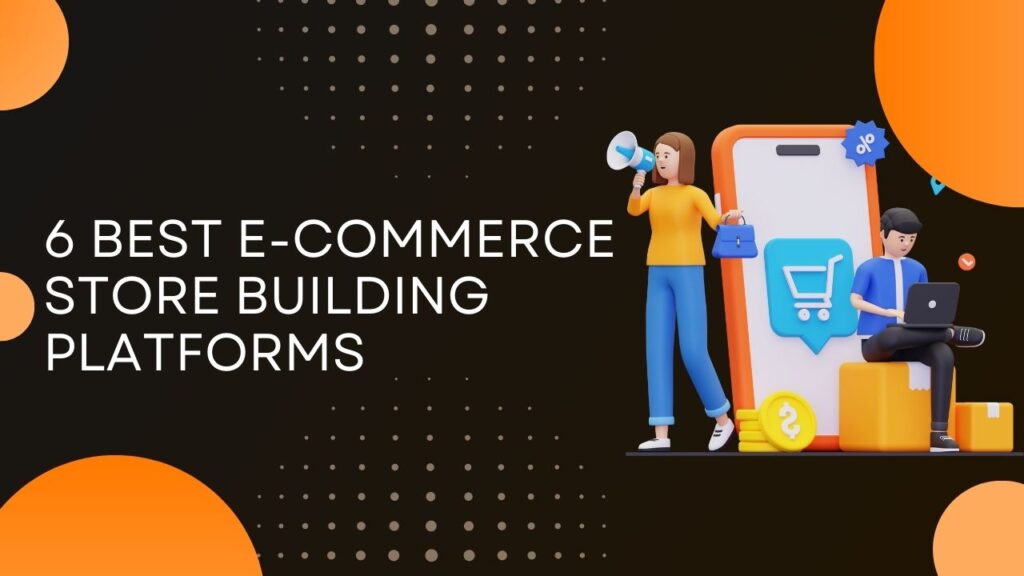In today’s technologically evolved world, the way of buying and selling goods has significantly changed. E-commerce stores can reach customers all over the world and operate around the clock, without the limitations of physical store time or locations. For businesses ready to dive into the digital marketplace, it’s critical to have a reliable, user-friendly platform on which to build your online store.
6 Best E-commerce store Building paltforms
Shopify: The Powerhouse of E-commerce Store
Shopify leads the pack in the e-commerce store platform market due to its comprehensive range of features and easy-to-use interface. It offers a suite of services including marketing, payments, shipping, and customer engagement tools that simplify the process of running an online store for small to medium-sized businesses. Shopify also has a robust app marketplace where store owners can find just about any extra functionality they might need.
One key aspect of Shopify is its high level of customizability. Users have access to a wide variety of themes, many of which are responsive to mobile devices. Shopify is a fantastic choice if you have precise ideas for how you want your store to appear. Furthermore, Shopify provides outstanding 24/7 customer support, which can be a time saver when you hit a stumbling block in your e-commerce store journey.
- User-Friendly: Intuitive dashboard for easy setup and management.
- Robust App Store: Wide range of plugins for extended functionality.
- Multichannel Selling: Sell on multiple platforms from a single system.
BigCommerce: A Powerful All-in-One Solution
Another popular option is BigCommerce, especially for larger companies with more complicated requirements. It has excellent built-in features, which eliminate the need for many external apps. This can result in a less cluttered workspace and lower costs.
BigCommerce is a powerful platform designed for high-volume transactions. With robust SEO features, it can help your site get noticed in search engine results. Also, it offers great integration capabilities with multiple payment gateways, social media platforms, and offline inventory systems.
- Built-In Features: Includes native blogging, reviews, and search filters.
- SEO Optimized: Advanced SEO features for enhanced visibility.
- Multi-Currency Support: Allows shopping and checkout in local currency.
WooCommerce: The Best for WordPress Websites
WooCommerce is a great option for individuals who are already familiar with WordPress and how it functions as an e-commerce store platform. A WordPress website can become a complete online store with the help of this free plugin. WooCommerce is perfect for small businesses or startups who are already comfortable with WordPress and want an easy way to expand into an e-commerce store.
WooCommerce offers a great level of customization thanks to the abundance of accessible plugins and themes. It offers all the basic features you’d expect from an e-commerce store platform, including product pages, shopping carts, and checkout processes. Plus, with its open-source nature, you have a vast community of developers continuously improving the platform and offering support.
- WordPress Integration: Seamless integration with WordPress websites.
- Open-Source: Allows extensive customization of the online store.
- Plugin Library: Access to a large number of WordPress plugins.
Magento: An Enterprise-Level Platform
Magento, an Adobe company, is a leading platform for enterprise-level businesses that need a high degree of customization and have a larger budget. While it’s not as beginner-friendly as Shopify or WooCommerce, it offers a suite of powerful features and incredible flexibility.
Magento has an open-source edition that can be self-hosted, which allows companies with in-house tech teams to customize every aspect of their online store. However, the true power of Magento lies in its Commerce edition, which comes with features designed to handle massive amounts of traffic and transactions.
- Scalability: Handles high volumes of inventory and sales.
- Advanced Customization: Unparalleled customization due to its open-source nature.
- B2B Features: Includes features like quotation management and price negotiation.
Wix eCommerce: Perfect for Creatives
Wix eCommerce is a great option for creatives and smaller businesses who want to build an aesthetically pleasing online store without coding. Users can exactly construct their websites using its drag-and-drop builder. Wix offers many templates adjusted to different industries and a suite of integrated tools for managing products, inventory, and orders.
While it’s not as robust as some other platforms, Wix eCommerce is constantly improving and adding new features. Wix is a good option for small firms who want to present their products in a visually pleasing way.
- Drag-and-Drop Editor: Easy website design without coding skills.
- Visual Product Display: Beautiful product galleries for an enhanced visual presentation.
- Mobile Optimization: Ensures your store looks great on all devices.
Squarespace: Best for Beautiful Design and Simplicity
Squarespace is a well-liked option for companies who value design and is great because of its gorgeous, designer-quality templates. Squarespace’s templates are not just about looks, though; they’re also designed to provide a superb user experience.
Although Squarespace doesn’t have as many advanced e-commerce store features as Shopify or BigCommerce, it provides all the necessary functionality for small to medium-sized online stores. It’s simple to use, with a clear interface and useful guides, making it a solid choice for those without much technical expertise.
- Designer Templates: Professional, visually stunning templates.
- Built-in Analytics: Provides insights into audience interaction and product popularity.
- Integrated Email Marketing: Allows on-brand email campaigns.
Conclusion
Selecting an e-commerce store platform is an important decision that should align with your business goals, technical ability, and budget. Each of the platforms mentioned above offers different strengths, from Shopify’s all-around versatility to WooCommerce’s magnificent integration with WordPress, and Magento’s enterprise-level capabilities. Remember, what’s most important is choosing a platform that suits your business’s specific needs and growth plans. The future of retail is digital, so make sure your business is ready to make its mark in the online marketplace.

